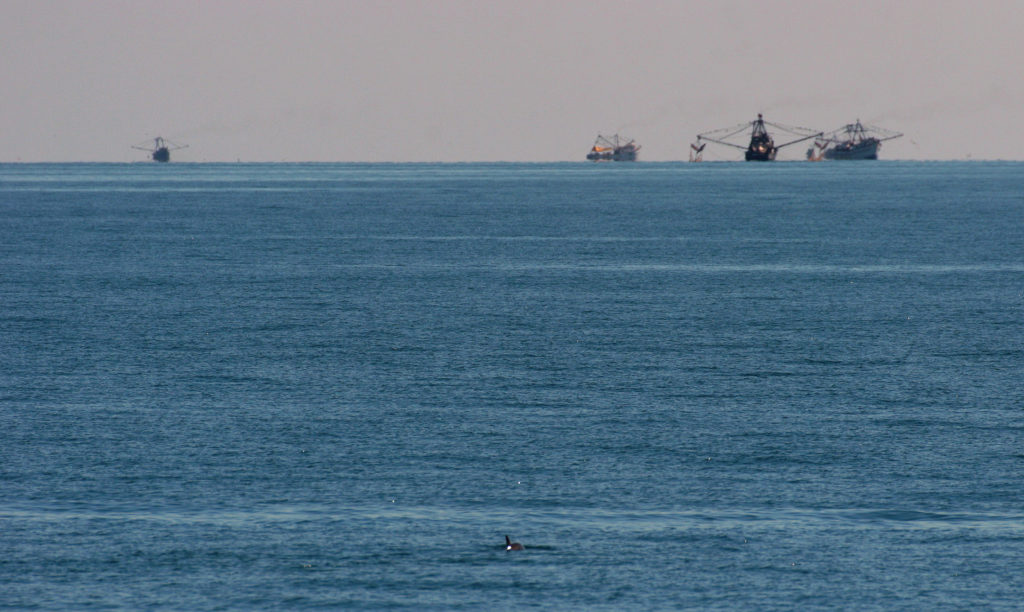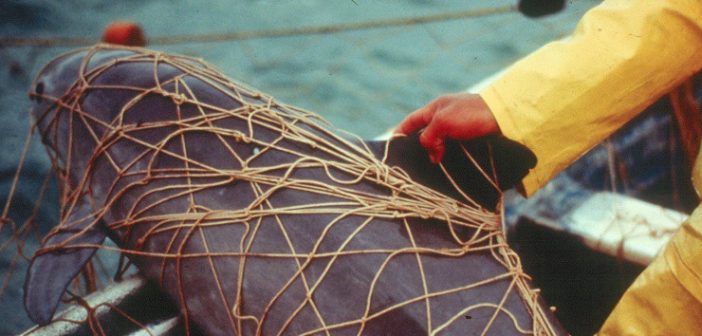As governments from around the world prepare to meet in Geneva for the 18th Conference of the Parties to the Convention on International Trade in Endangered Species (CITES), a new report urges the imposition of trade suspensions against Mexico for its failure to protect the critically endangered vaquita from illegal fishing and trade in the totoaba, a large fish found in Mexico’s Gulf of California.
The vaquita, the world’s smallest and most endangered cetacean (the order of marine mammals that includes whales, dolphins, and porpoises), is found only in Mexico’s northern Gulf of California. Scientists recently announced that as few as 10 vaquita porpoises are estimated to survive in the world – a direct result of rampant and uncontrolled illegal fishing for totoaba, who are poached for their swim bladder or maw.
Totoaba maws are trafficked by organised criminal syndicates from Mexico to China, where they are highly valued for their purported medicinal properties. Prices can exceed $20,000/kg.

A vaquita swims in the foreground while fishing boats loom in the background. Image credit Paula Olson, NOAA, CC BY-SA 3.0.
CITES’s Last Chance: Stop the illegal totoaba trade to save the vaquita details investigations by the London-based Environmental Investigation Agency (EIA) into the totoaba trade in Mexico and China, and describes a persistent failure by Mexico to address the illegal fishing and trade, despite repeated commitments to do so.
One vaquita mortality has been documented so far in 2019 and the International Committee for the Recovery of the Vaquita (CIRVA) reported in March 2019 that “enforcement efforts have been completely ineffective in reducing the illegal totoaba fishery in the Upper Gulf of California.”
CIRVA has emphasised that the vaquita is not yet extinct and recovery remains a possibility, albeit slim. They are still producing offspring and the remaining animals are healthy, showing no signs of disease or malnutrition.
In 2016, CITES Parties adopted a series of decisions aimed at addressing the illegal fishing and trade of totoaba. These decisions have been only partially implemented at best and lack the force and urgency required in the face of imminent extinction of the vaquita.
Clare Perry, EIA Ocean Campaigns Leader, said: “The apathetic response to the CITES decisions on the vaquita and totoaba is inexcusable in the face of the looming extinction of the vaquita.
“This is the last chance for CITES to spur real action to save the vaquita – because unless the illegal fishing and illegal trade driving it are stopped, there will simply be no vaquita left in existence at the next Conference of the Parties in 2022. That will be on us, a major extinction on our watch at the hands of criminals, and CITES must take the strongest possible steps at this meeting to avert such an outcome.”

A pair of vaquita. Action must be taken immediately to protect the few remaining vaquita from extinction. Image credit NOAA Fisheries West Coast, CC BY-SA 3.0.
CITES Parties are scheduled to discuss the crisis during a session on August 20th, where, it is hoped, Mexico will be censured for its ongoing failures to stop illegal fishing and trade in totoaba parts.
“For decades, Mexico has failed the vaquita and the international community by making and breaking multiple commitments to protect the species and its habitat,” said DJ Schubert, wildlife biologist at the Animal Welfare Institute. “CITES Parties must act decisively to ensure that Mexico follows through and saves this species before the vaquita is lost forever.”
“Even as vaquita porpoises teeter on the very edge of extinction, the Mexican Government is still failing to protect them,” said Alejandro Olivera, Mexico’s representative at the Center for Biological Diversity. “Mexico has made only empty promises to save these porpoises from deadly nets, without real enforcement on the water. The world is watching and President Lopez Obrador has to stop all gillnet fishing and save the vaquita.”
“The extinction of the vaquita is entirely avoidable,” said Zak Smith, senior attorney with the Natural Resources Defense Council’s marine mammal protection project. “The international community must hold Mexico accountable for its current approach, which is guaranteeing vaquita extinction, and compel and support a new, vigorous plan for vaquita survival.”
Featured image: a vaquita is entangled in a fishing net as bycatch. Image credit Christian Faesi, Copyright Omar Vidal, CC BY-SA 3.0.





